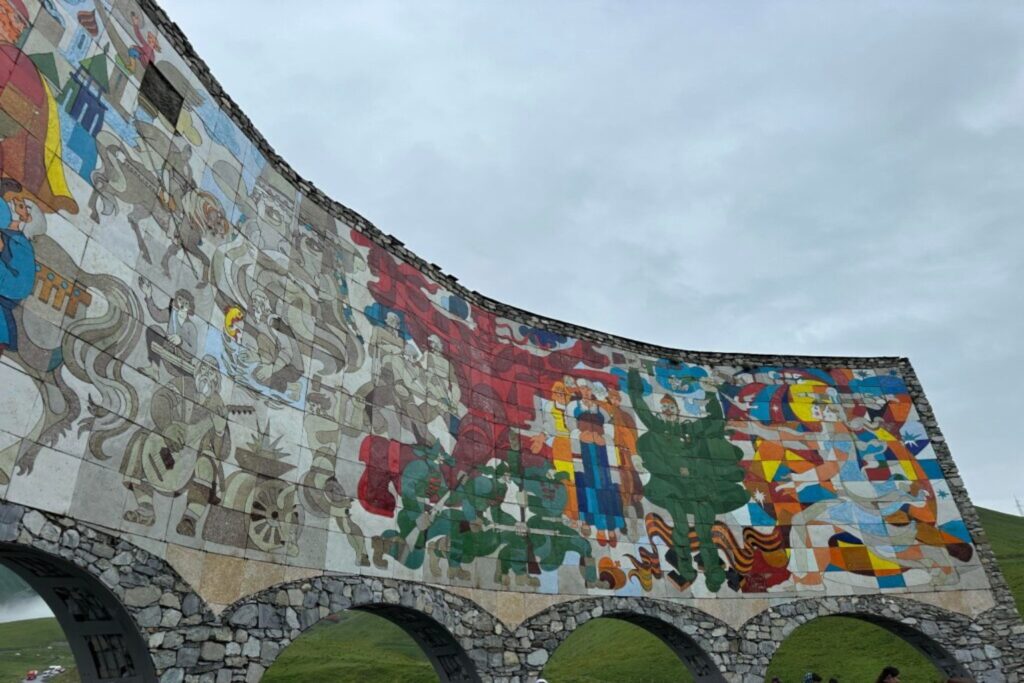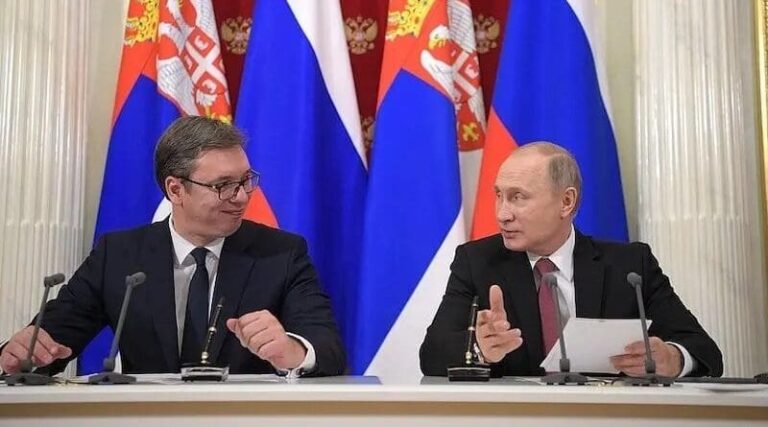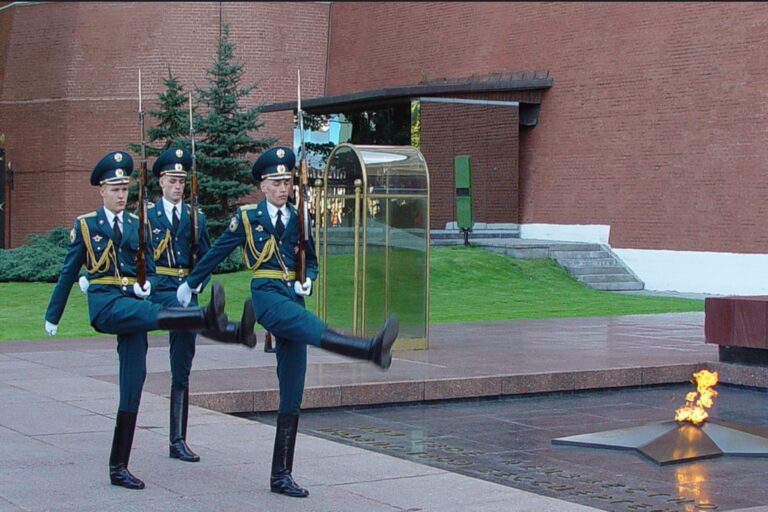Rustaveli Avenue, Tibilisi, is where Georgia’s culture and politics converge, lined by institutions including the National Museum and the Georgian Parliament. This May, the slogan “Yes to Europe, No to Russian Law” resounded through the avenue as Georgians protested the “foreign agents” law.
Georgia is between the grip of Russia and the promise of the EU. The question of where Georgia is heading has an important cultural aspect. The link to the country’s ancient civilizations and the myth of its Europeanness are essential to its independent statehood. However, under Russia’s threat and an increasingly authoritarian government, Georgian cultural heritage faces risks of destruction and misappropriation. The international community should be alert to the cultural dimension of Russia’s aggression in Georgia and support civil society organizations that advocate for Georgia’s national identity.
Soviet Heritage and Russian Disinformation
After the 2008 Russo-Georgian War, Russia established military occupation in South Ossetia and Abkhazia. The war in the information domain, however, is ongoing. Russia’s disinformation campaigns leverage cultural and historical narratives to pull Georgia from the West.
Russia’s propaganda strategy capitalizes on Georgia’s “traditional values” and distorts its history: EU alignment and LGBTQ+ acceptance are perversities that threaten the “Georgian identity”, and Georgia’s entry into the Soviet Union predetermined its return to Russia’s orbit. Cultural heritage has an important role in Russia’s disinformation strategy. The most recent Russian Foreign Policy Concept of 2023 emphasizes the uniqueness of Russia’s cultural heritage and the need to “disseminate accurate information abroad about the role and place of Russia in world history”.
Russia’s weaponization of cultural heritage is evident in the case of Ukraine. After it annexed Crimea in 2014, Russia illicitly exported artifacts and “renovated” sites to justify its presence and diminish the historical presence of minorities. The Soviet Union is frequently evoked in propaganda. During the ongoing Russia-Ukraine War, the Kremlin spreads revisionist narratives about Ukraine’s Soviet-era history, framing Russia’s aggression as the continuation of the fight against Nazis. In occupied zones, Russian forces actively reinstalled Soviet-era monuments, while at least 14 memorials commemorating the victims of the Holodomor—the starvation of millions of Ukrainians due to Soviet policy—were dismantled in Kherson Oblast alone.
The situation in Ukraine serves as a stark warning for Georgia. In Georgia, complicated memories of the Soviet Union, embodied especially in the monuments of Joseph Stalin, are an exploitable source of societal fragmentation. In 2010, then-president Mikheil Saakashvili ordered the statue of Stalin in the central square of Gori to be replaced with a monument commemorating the victims of the 2008 Russia-Georgian War. Georgian media hailed the move as “a sign of Georgia’s Western orientation”, though some from the older generation, who are nostalgic for the Soviet era, felt offended. This fight, which has evolved around Stalin’s specter, has continued for over a decade.
How the Kremlin Takes Advantage of Stalin’s Controversial Legacy
In January this year, an activist splashed paint on an icon in Tbilisi’s Holy Trinity Cathedral, which portrayed Stalin in one corner. This controversial incident highlights the splintered viewpoints in Georgian society regarding Stalin’s legacy and his place in the country’s history. According to the most recent 2024 survey by Caucasus Research Resource Center, 32% of Georgian respondents characterized their attitude toward Stalin as “admiration”, “respect”, or “sympathy”, while 27% chose “antipathy, irritation”, “fear”, or “disgust, hatred”. Concealed beneath these strong views are fragmented opinions about what “Stalin” represents and his connection with totalitarianism. Some Georgians see Stalin as a rebellious “our boy” who fought existing orders and rose to the top of a system led by Russians, while others admire him as a “wise leader” who stabilized the Soviet Union. Still others condemn him as a tyrant who embodies autocracy.
Georgians and Russians may share the nostalgia for their Soviet heritage, but the Kremlin would not hesitate to exploit this common ground. In recent years, Russian President Vladimir Putin has been keen on resurrecting a cult of personality around Stalin, looking to justify his autocratic rule with the precedent of the Soviet strongman. While this tactic does not specifically target Georgia, Georgia is highly susceptible to the Kremlin’s rhetoric. Indeed, some social groups that view Stalin positively are also more open to the Russian media narrative.
However, more fundamentally, a comprehensive discourse about Stalin’s role in Georgian nation-building, if not a “de-Stalinziation” campaign, has not occurred in Georgia. Despite the 2011 adoption of the Freedom Charter law, which prohibits the display of Soviet and Fascist symbols, over 10 Stalin statues appeared in Georgian cities and villages in 2012 alone. So far, national-level efforts to confront the specter of Stalin have focused on controlling the display of Stalin’s material embodiments, while his controversial legacy keeps fueling divides among Georgians.
Stalin’s lingering presence points to Georgia’s convoluted relationship with a political system it seeks to break away from but remains entangled with. Simply exorcizing the Soviet past or embracing it are equally impossible. How Georgia will carry forth with Stalin’s legacy is still an open question.
Cultural Heritage under Russian Occupation
While Georgia has to reconcile with its national memory, Russia is gradually erasing Georgian history from the occupied territories. The Ministry of Foreign Affairs of Georgia lists the “destruction or damage of cultural heritage monuments” as one of the country’s top national security threats. This threat is especially prominent in South Ossetia and Abkhazia. Under Russian occupation, Georgian cultural heritage in the two separatist regions underwent destruction that erased Georgians’ historical presence on the land. In South Ossetia, Georgian place names have been translated into Ossetian or adapted by adding or removing letters. Rehabilitation of certain sites was unprofessional, with unqualified workers replacing Georgian-style decorations with Russian ones. Several eyewitnesses have reported illegal digging and the use of metal detectors near historical sites.
In Abkhazia, illegal archaeological excavations have been reported since 2013. Several excavations were also conducted with the involvement of the Institute of Archeology of the Russian Academy of Sciences. The “restoration” of some heritage sites in Abkhazia also had the opposite effect of obliterating Georgian cultural heritage. The so-called “rehabilitation” of the 11th-century Ilori St. George Church, for instance, erased the Georgian inscriptions on the church’s outer walls and gave it an onion-shaped dome, a typical Russian architectural feature.
The destruction of cultural heritage in the occupied regions jeopardizes the civilians’ safety and cultural rights. The Russian occupying force often appropriates destroyed villages as training grounds. In 2017, Russian forces destroyed a registered historical site near the village of Tsebelda, Abkhazia, to prepare the area for a military firing range. The imminence of firearms poses a constant threat to civilians. On November 6th, 2023, two Georgian citizens were attacked by Russian occupation forces when trying to access the abandoned Church of St. Lomisa, which is located on the so-called South Ossetian administrative boundary line. In such cases, Georgian civilians who suffer from violence and restricted access to holy places are deprived of their right to take part in cultural life, one of the core human rights in the International Covenant on Economic, Social, and Cultural Rights.
Legal Challenges of Cultural Preservation and Alternative Solutions
The prospect of strengthening cultural heritage protection in Abkhazia and South Ossetia through law remains bleak. Article 7 of the Law of Georgia on Occupied Territories applies to the protection of cultural heritage. The law specifies that “the responsibility of the Russian Federation, as the state carrying out military occupation, to protect cultural heritage in the occupied territories shall be established under the norms and principles of international law.” Russia and Georgia are parties to the 1954 Hague Convention, which supplies the norms and principles of cultural heritage protection during armed conflicts. According to the Convention, a state exercising military occupation of another state should “as far as possible support the competent national authorities of the occupied country in safeguarding and preserving its cultural property”. However, due to closed borders, the government of Georgia has no means to ascertain the condition of Georgian heritage sites in either of the occupied regions.
Amid the political stalemate, track II engagement led by international organizations sometimes achieves progress. In the confidence-building measures programs held by the Council of Europe in 2017, Georgian cultural heritage professionals met with their Abkhazian and South Ossetian counterparts, attending seminars on museum management and exchanging information about the current state of certain monuments. Similar discussions between experts in non-political contexts can provide an alternative channel to push forward conservation projects.
The Foreign Agents Law
Georgian and international civil society organizations protect Georgian heritage and promote dialogues about the nation’s identity. However, democratic backsliding in Georgia renders their future in doubt. The “foreign agents” bill was re-introduced into the parliament by the leading Georgian Dream party in early April and signed into law on June 3rd, despite the protest. Under the law, all organizations receiving more than 20% of their funding from overseas should register as “agents of foreign influence”, and organizations that don’t comply will be fined.
The “foreign agents” law resembles its Russian counterpart. Russia adopted the Foreign Agents Law in 2012, requiring NGOs that receive foreign funds and engage in “political activities” to register as “foreign agents”, a designation associated with “espionage” and “treason”. Since then, the Kremlin has weaponized the law to impose sanctions on the Russian civil society and persecute activists. Justifying the “foreign agents” law, Georgian Dream’s founder Bidzina Ivanishvili described NGOs as “having no homeland” and accused foreigners of manipulating Georgia’s politics through “non-transparent NGO funding.”
The “foreign agents” law comes when Georgia’s cultural sector is already at risk. Under the current Minister of Culture Tea Tsulukiani, a senior member of Georgian Dreams, the arts and cultural sector is losing its independence and freedom of expression. The Ministry of Culture has reorganized the Georgian National Museum and the National Agency for Cultural Heritage Protection, dismissing at least 75 employees from each institution. The laid-off employees were questioned about their support for the Ministry and former government officials. The Ministry has also interfered with the grants for cultural research by restricting access to funding from the Shota Rustaveli National Science Foundation, the only funding opportunity for cultural research that the Ministry does not control.
While the Ministry of Culture has crippled the domestic support for cultural projects, the “foreign agents” law can further isolate Georgia’s cultural sector from international collaborations. Georgian NGOs have closely worked with international partners to preserve Georgian cultural heritage. The Georgian National Committee of Blue Shield (GNCBS), collaborating with the Penn Cultural Heritage Center and the U. S. Embassy, launched projects that build resilience among IDPs from the Tskhinvali Region through cultural heritage. Georgia’s many cultural heritage sites also benefit from international funding. The Getty Foundation’s funding and the U.S. Ambassador’s Fund for Cultural Preservation enabled conservation projects of monuments including Uplistsikhe and Martvili Monastery.
Under the “foreign agents” law, however, many cultural heritage professionals working in Georgia will have to register as “foreign agents”. This alienation of international partners feeds into the year-old myth that Western powers hinder Georgia’s national development by undermining its unique cultural-historical identity. International partnerships to promote and research Georgian cultural heritage risk being politicized as battlegrounds between “Western influence” and “Georgian identity”. The “foreign agents” law could also impose additional obstacles on the already long cycle of international grant allocation. Whereas the U.S. Ambassadors Funds for Cultural Preservation grant for the conservation of the Jvari Monastery was announced in 2020, the Ministry of Culture took over three years to give it final approval, possibly intentionally. It remains to be seen whether the Ministry of Culture will use the law to halt or delay similar projects in the future.
Conclusion
As Georgia delineates its identity as a strong, independent democracy, its rich heritage informs discussions on what it means to be “Georgian”. Safeguarding Georgian cultural heritage amid the current uncertainties requires the effort of both academics and state actors.
The international community should analyze the pattern of Russian “memory wars” in post-Soviet states. The Kremlin consistently leverages ancient history and Soviet-era memories to undermine the states’ independent identity. Georgia’s Euro-Atlantic partners should carefully assess these disinformation campaigns and develop Counter-messaging that emphasizes the sovereignty of the targeted states.
To preserve Georgian cultural heritage on the ground, international research institutions can collaborate with their Georgian counterparts to build a stronger network of cultural heritage professionals. A global network can facilitate programs that strengthen Georgia’s technical capacity to document and digitize at-risk sites. As the “foreign agents” law comes into effect, collaborators should be sensitive to the needs of Georgian researchers facing impediments and closely monitor the law’s impact on international grant allocation.
References
“Live Blog: ‘Yes to Europe, No to Russian Law’ – Rallies Against Foreign Agents Bill”, Civil Georgia, June 5, 2024, https://civil.ge/archives/600995
Office of the High Commissioner For Human Rights, “Georgia: UN experts condemn adoption of Law on Transparency of Foreign Influence”, May 15, 2024.
Natalie Sabanadze, “EU-Georgia Relations: A Local Show of the Global Theater,” Carnegie Europe, https://carnegieendowment.org/research/2023/11/eu-georgia-relations-a-local-show-of-the-global-theater?lang=en¢er=europe
Nana Tchanturia, “European Commission Calls on Georgia to Fight Kremlin Propaganda,” Civil Georgia, https://civil.ge/archives/574410
Irakli Sirbiladze, Russia’s Disinformation Campaigns in Georgia: A Study of State and Civil Society Response (PMC Research Center, 2019), https://www.pmcresearch.org/policypapers_file/f6ac5dfb34c12e31c.pdf
The Ministry of Foreign Affairs of the Russian Federation, The Concept of the Foreign Policy of the Russian Federation (2023), https://mid.ru/en/foreign_policy/fundamental_documents/1860586/
Dr. Kateryna Busol and Alina Frolova, Cultural Heritage as an Element of National Security: the Crimea Lens, Center for Defence Strategies (Centre for Defence Strategies, 2021), https://defence.org.ua/wp-content/uploads/doslidzhennya/CDS-Cultural-Heritage-eng.pdf
Russian Mission in Geneva, “President Vladimir Putin’s video address on February 24, 2022”, https://twitter.com/mission_russian/status/1496874393485598725?s=20&t=glWDTkaqh_jSoy-bt179HA
Jade McGlynn, “Russia Is Committing Cultural Genocide in Ukraine,” Foreign Policy, April 23, 2024, https://foreignpolicy.com/2024/04/23/russia-ukraine-cultural-genocide-looting-indoctrination-deporatation/
Luke Harding, “In Joseph Stalin’s birthplace, tyrant is finally toppled,” The Guardian, June 25, 2010, https://www.theguardian.com/world/2010/jun/25/georgia-gori-topples-joseph-stalin-statue
Felix Light, “Defacing of Stalin icon exposes deep divisions in his home country Georgia,” Reuters, January 10, 2024, https://www.reuters.com/world/europe/defacing-stalin-icon-exposes-deep-divisions-his-home-country-georgia-2024-01-10/
Caucasus Research Resource Center, Caucasus Barometer 2024 Georgia, https://caucasusbarometer.org/en/cb2024ge/STLN1/
Iasha bakradze, Maria Lipman, Lev Gudkov, and Lasha Bakradze,“GEORGIA AND STALIN: Still Living With the Great Son of the Nation.” Edited by thomas de waal. THE STALIN PUZZLE: Deciphering Post-Soviet Public Opinion. Carnegie Moscow Center, 2013. http://www.jstor.org/stable/resrep21100.9.
“In Stalin’s Growing Shadow: Is the dead tyrant Russia’s soft asset in Georgia?”, Civil Georgia, April 8, 2022, https://civil.ge/archives/503086
“Interview | Dr. Claire P. Kaiser: Nuance is Necessary for Understanding Georgia in the Soviet period”, Civil Georgia, Sept 8, https://civil.ge/archives/511069
Law of Georgia on Freedom Charter (2013),https://matsne.gov.ge/ru/document/download/1381526/8/en/pdf
Nino Narimanishvili and David Pipia, “Stalin and Georgia: the history of complicated relations”, JAM News, March 7, 2024, https://jam-news.net/stalin-and-georgia-the-history-of-complicated-relations/
Ministry of Foreign Affairs of Georgia, National Security Concept, https://mfa.gov.ge/en/national-security-concept
Manana Tevzadze et al., Report on the Implementation of International Humanitarian Law with regards to the Protection of Cultural Heritage in the Occupied Tskhinvali Region, Georgia (2022), http://map.blueshield.ge/Files/Report%20on%20cultural%20heritage%20in%20Georgia’s%20occupied%20territories_Final_Redacted.pdf
Blue Shield Georgia, “The State of Georgian Cultural Heritage in the occupied Georgian regions of Abkhazia and Tskhinvali region/South Ossetia”, July 28, 2023, https://blueshield.ge/?p=9913&lang=en
Office of the High Commissioner For Human Rights, “The State of Georgian Cultural Heritage in the occupied Georgian regions of Abkhazia and Tskhinvali region/South Ossetia (March 2016), July 14, 2016, https://www.ohchr.org/sites/default/files/Documents/Issues/CulturalRights/DestructionHeritage/States/Georgia.pdf
NBC, “Study: Georgia villages ‘torched’ after invasion,” October 9, 2008, https://www.nbcnews.com/id/wbna27105641
Human Rights Watch, “Georgian Villages in South Ossetia Burnt, Looted”, August 13, 2008, https://www.hrw.org/news/2008/08/12/georgian-villages-south-ossetia-burnt-looted
Kate M. Byrnes, “Condemnation of Russia’s Destruction of Cultural Heritage in Georgia | Statement to the PC,” U.S. Mission to the OSCE, January 19, 2017, https://osce.usmission.gov/condemnation-of-russias-destruction-of-cultural-heritage-in-georgia-statement-to-the-pc/
Blue Shield Georgia, “The statement about the armed attack carried out by the Russian occupation forces near the Lomisa church in the village of Kirbali”, November 9, 2023, https://blueshield.ge/?p=10056&lang=en
Article 15, International Covenant on Economic, Social and Cultural Rights, https://www.ohchr.org/en/instruments-mechanisms/instruments/international-covenant-economic-social-and-cultural-rights
Law of Georgia on Occupied Territories (2008), https://matsne.gov.ge/en/document/view/19132?publication=6
Convention for the Protection of Cultural Property in the Event of Armed Conflict with Regulations for the Execution of the Convention (1954), https://www.unesco.org/en/legal-affairs/convention-protection-cultural-property-event-armed-conflict-regulations-execution-convention?hub=415
Council of Europe, Consolidated report on the conflict in Georgia (April 2017 – September 2017) (2017), https://rm.coe.int/1680763063
“Between Two Russian Laws: A Year Since March Protests”, Civil Georgia, March 8, 2024, https://civil.ge/archives/585913
Felix Light, “Georgian parliament votes to override presidential veto of ‘foreign agent’ bill”, Reuters, May 28, 2024, https://www.reuters.com/world/europe/georgian-parliament-votes-override-presidential-veto-foreign-agent-bill-2024-05-28/
Norwegian Helsinki Committee, Russia’s Foreign Agent law: Violating human rights and attacking civil society (2018), https://www.nhc.no/content/uploads/2018/08/NHC_PolicyPaper_6_2014_Russiasforeignagentlaw.pdf
Human Rights Watch, “Georgia: ‘Foreign Influence’ Bill Threatens Rights”, May 9, 2024, https://www.hrw.org/news/2024/05/09/georgia-foreign-influence-bill-threatens-rights
PEN America, Taming Culture in Georgia: Georgian Government Clamps Down on Freedom of Speech and Cultural Expression (2023), https://pen.org/report/taming-culture-in-georgia/
Blue Shield Georgia,“Preserving the Cultural Heritage of the Occupied Regions (Tskhinvali Region- PCHOR) Project”, October 3, 2022, https://blueshield.ge/?p=9416&lang=en
Tamar Sopromadze, “Which Religious Buildings in Georgia Has the U.S. Supported to Restore”, Myth Detector, August 8, 2022, https://mythdetector.ge/en/which-religious-buildings-in-georgia-has-the-us-supported-to-restore/ Sopo Gelava, “MYTH: THE USA COMBATS CULTURAL IDENTITY, RUSSIA IS A THIRD ROME”, Myth Detector, February 23, 2017, https://mythdetector.ge/en/myth-the-usa-combats-cultural-identity-russia-is-a-third-rome-2/#




